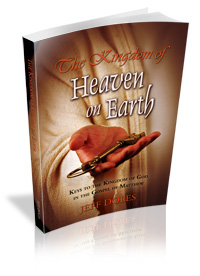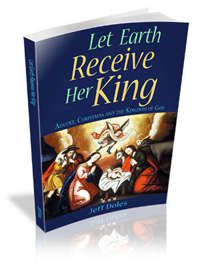So Jesus answered and said to them, “Have faith in God. For assuredly, I say to you, whoever says to this mountain, ‘Be removed and be cast into the sea,’ and does not doubt in his heart, but believes that those things he says will be done, he will have whatever he says.” (Mark 11:22-23)
This past month I slowed my pace down a bit in order to give attention to a health issue that came up over Christmas. Early on December 26th I awoke with abdominal pain from what turned out to be a kidney stone. Praise God, the stone passed within a couple of days, and with relatively little pain. The stone was small, and remembering how Jesus said we could speak to mountains and expect to see them move, I figured I could speak to a small kidney stone and expect to get results. So I told it to break up and dissolve harmlessly away. And it did, breaking up into tiny fragments. Praise God.
This incident, however, alerted me to a larger issue. On that first morning when I was experiencing so much pain, Suzanne drove me to the walk-in clinic where the doctor did a few tests, including blood work. Well, one of the things the blood test showed was that I had a very high glucose level—and that ain’t good. So this past month I have been addressing that.
First, I repented for eating like a fool and abusing my body, especially my pancreas, with all the sweets and sugars I had been consuming (especially at Christmas). Then I began to apply the power of the name and blood of the Lord Jesus Christ to the problem, claiming the promises of God and the healing Jesus came to bring us (according to Isaiah 53:4-5). Next, I asked God to give me wisdom concerning the changes in lifestyle I knew I would need to make in my eating habits, and also concerning exercise. I was not eating terribly poor, but I was not eating very well either, and I had become too sedentary—a bad combination.
The Lord led us to a good doctor who has more confidence in the natural foods designed by God than he does in prescribing medicines (though he does prescribe when necessary). He diagnosed the problem as hypoglycemia and recommended a diet with plenty of raw foods (vegetables, nuts, seeds, whole grains and fruit—light on the fruit) and regular exercise. The Lord also led me to a good book that helped me understand that the root problem is insulin resistance and gives me a good nutritional plan for overcoming it. The book is called The Insulin-Resistance Diet, by Hart and Grossman, and offers a simple plan for “linking and balancing” carbohydrates with proteins for managing metabolism and blood glucose.
I’ve started being kind to my pancreas. The Bible tells me that I am “accepted in the Beloved” (Ephesians 1:6). I believe that includes all of me, including my pancreas and the insulin it produces. So I am being kind and telling my body to quit resisting that insulin but to use it appropriately. I have also started to get regular exercise, right now mostly through walking, and using a mini-trampoline (which is harder than it looks) along with some other forms. I bought a blood glucose monitor and check myself every morning. I am happy to report that I am now getting normal readings—and I’m losing weight, too. Praise God for His faithfulness, and for His wisdom which is teaching me new habits for a long and healthy life.
So my focus in January was largely on those things, which is why I have not blogged as much lately. But as these new health disciplines become naturalized habits, I am ready to get back up to speed with teaching, writing and other ministry tasks.
It is good to know who we are in Jesus Christ, that we are accepted in the Beloved, and what we can do through faith in God and His Word.

Healing Scriptures and Prayers
by Jeff Doles
Preview with Amazon’s “Look Inside.”
Available in paperback and Kindle (Amazon), epub (Google and iTunes) and PDF.



